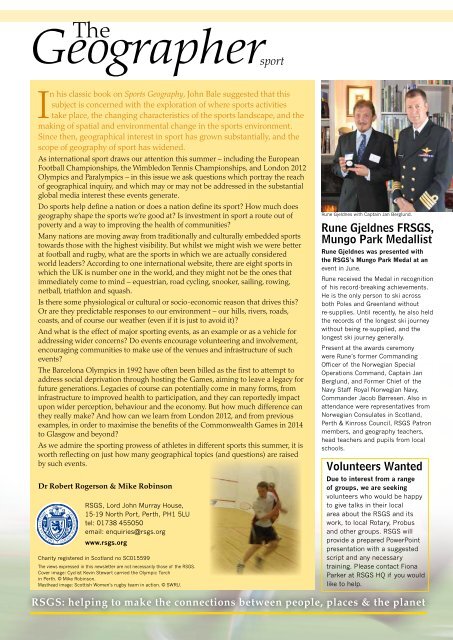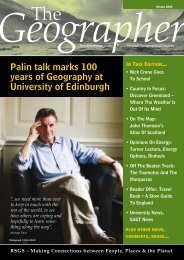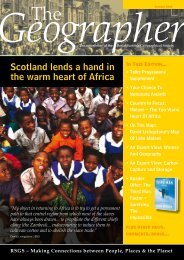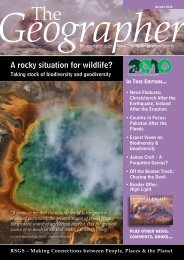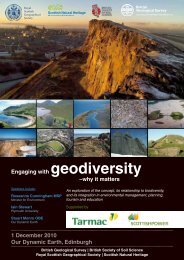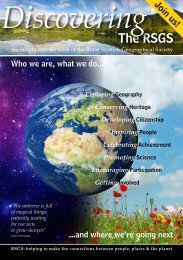Summer - Royal Scottish Geographical Society
Summer - Royal Scottish Geographical Society
Summer - Royal Scottish Geographical Society
Create successful ePaper yourself
Turn your PDF publications into a flip-book with our unique Google optimized e-Paper software.
The<br />
Geographersport<br />
In his classic book on Sports Geography, John Bale suggested that this<br />
subject is concerned with the exploration of where sports activities<br />
take place, the changing characteristics of the sports landscape, and the<br />
making of spatial and environmental change in the sports environment.<br />
Since then, geographical interest in sport has grown substantially, and the<br />
scope of geography of sport has widened.<br />
As international sport draws our attention this summer – including the European<br />
Football Championships, the Wimbledon Tennis Championships, and London 2012<br />
Olympics and Paralympics – in this issue we ask questions which portray the reach<br />
of geographical inquiry, and which may or may not be addressed in the substantial<br />
global media interest these events generate.<br />
Do sports help define a nation or does a nation define its sport? How much does<br />
geography shape the sports we’re good at? Is investment in sport a route out of<br />
poverty and a way to improving the health of communities?<br />
Many nations are moving away from traditionally and culturally embedded sports<br />
towards those with the highest visibility. But whilst we might wish we were better<br />
at football and rugby, what are the sports in which we are actually considered<br />
world leaders? According to one international website, there are eight sports in<br />
which the UK is number one in the world, and they might not be the ones that<br />
immediately come to mind – equestrian, road cycling, snooker, sailing, rowing,<br />
netball, triathlon and squash.<br />
Is there some physiological or cultural or socio-economic reason that drives this?<br />
Or are they predictable responses to our environment – our hills, rivers, roads,<br />
coasts, and of course our weather (even if it is just to avoid it)?<br />
And what is the effect of major sporting events, as an example or as a vehicle for<br />
addressing wider concerns? Do events encourage volunteering and involvement,<br />
encouraging communities to make use of the venues and infrastructure of such<br />
events?<br />
The Barcelona Olympics in 1992 have often been billed as the first to attempt to<br />
address social deprivation through hosting the Games, aiming to leave a legacy for<br />
future generations. Legacies of course can potentially come in many forms, from<br />
infrastructure to improved health to participation, and they can reportedly impact<br />
upon wider perception, behaviour and the economy. But how much difference can<br />
they really make? And how can we learn from London 2012, and from previous<br />
examples, in order to maximise the benefits of the Commonwealth Games in 2014<br />
to Glasgow and beyond?<br />
As we admire the sporting prowess of athletes in different sports this summer, it is<br />
worth reflecting on just how many geographical topics (and questions) are raised<br />
by such events.<br />
Dr Robert Rogerson & Mike Robinson<br />
RSGS, Lord John Murray House,<br />
15-19 North Port, Perth, PH1 5LU<br />
tel: 01738 455050<br />
email: enquiries@rsgs.org<br />
www.rsgs.org<br />
Charity registered in Scotland no SC015599<br />
The views expressed in this newsletter are not necessarily those of the RSGS.<br />
Cover image: Cyclist Kevin Stewart carried the Olympic Torch<br />
in Perth. © Mike Robinson.<br />
Masthead image: <strong>Scottish</strong> Women’s rugby team in action. © SWRU.<br />
Rune Gjeldnes with Captain Jan Berglund.<br />
Rune Gjeldnes FRSGS,<br />
Mungo Park Medallist<br />
Rune Gjeldnes was presented with<br />
the RSGS’s Mungo Park Medal at an<br />
event in June.<br />
Rune received the Medal in recognition<br />
of his record-breaking achievements.<br />
He is the only person to ski across<br />
both Poles and Greenland without<br />
re-supplies. Until recently, he also held<br />
the records of the longest ski journey<br />
without being re-supplied, and the<br />
longest ski journey generally.<br />
Present at the awards ceremony<br />
were Rune’s former Commanding<br />
Officer of the Norwegian Special<br />
Operations Command, Captain Jan<br />
Berglund, and Former Chief of the<br />
Navy Staff <strong>Royal</strong> Norwegian Navy,<br />
Commander Jacob Børresen. Also in<br />
attendance were representatives from<br />
Norwegian Consulates in Scotland,<br />
Perth & Kinross Council, RSGS Patron<br />
members, and geography teachers,<br />
head teachers and pupils from local<br />
schools.<br />
Volunteers Wanted<br />
Due to interest from a range<br />
of groups, we are seeking<br />
volunteers who would be happy<br />
to give talks in their local<br />
area about the RSGS and its<br />
work, to local Rotary, Probus<br />
and other groups. RSGS will<br />
provide a prepared PowerPoint<br />
presentation with a suggested<br />
script and any necessary<br />
training. Please contact Fiona<br />
Parker at RSGS HQ if you would<br />
like to help.<br />
RSGS: helping to make the connections between people, places & the planet


